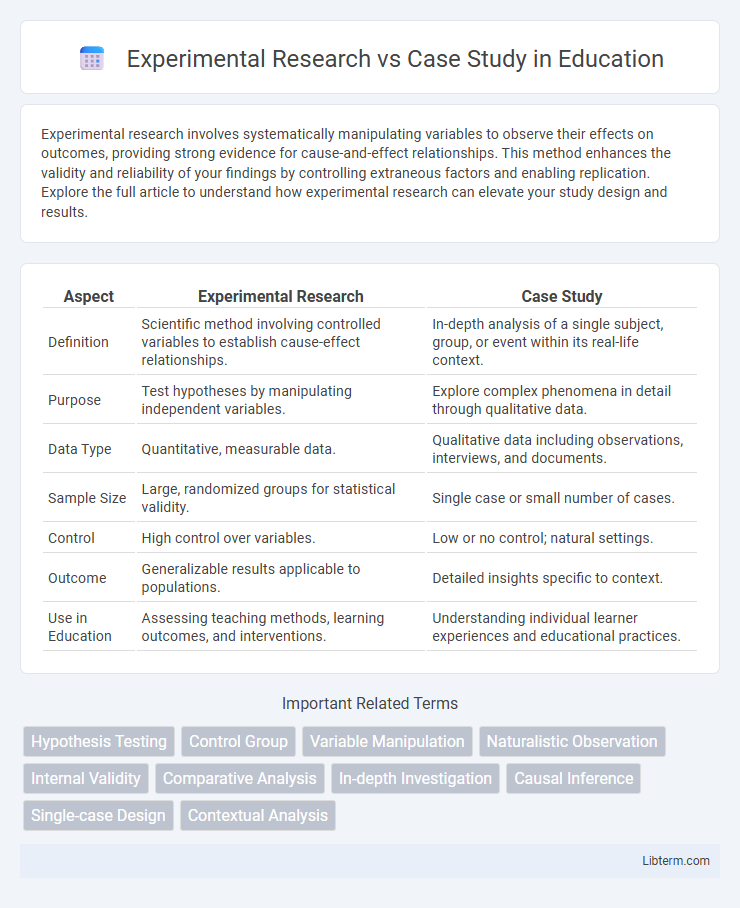Experimental research involves systematically manipulating variables to observe their effects on outcomes, providing strong evidence for cause-and-effect relationships. This method enhances the validity and reliability of your findings by controlling extraneous factors and enabling replication. Explore the full article to understand how experimental research can elevate your study design and results.
Table of Comparison
| Aspect | Experimental Research | Case Study |
|---|---|---|
| Definition | Scientific method involving controlled variables to establish cause-effect relationships. | In-depth analysis of a single subject, group, or event within its real-life context. |
| Purpose | Test hypotheses by manipulating independent variables. | Explore complex phenomena in detail through qualitative data. |
| Data Type | Quantitative, measurable data. | Qualitative data including observations, interviews, and documents. |
| Sample Size | Large, randomized groups for statistical validity. | Single case or small number of cases. |
| Control | High control over variables. | Low or no control; natural settings. |
| Outcome | Generalizable results applicable to populations. | Detailed insights specific to context. |
| Use in Education | Assessing teaching methods, learning outcomes, and interventions. | Understanding individual learner experiences and educational practices. |
Overview of Experimental Research
Experimental research involves systematically manipulating one or more variables to observe their effect on a dependent variable, establishing cause-and-effect relationships. This method relies on controlled environments, random assignment, and the use of experimental and control groups to ensure internal validity. It is widely employed in scientific fields like psychology, medicine, and social sciences for hypothesis testing and generating measurable data.
Overview of Case Study
Case study research involves an in-depth, contextual analysis of a single event, group, or individual to explore complex phenomena within real-life settings. It emphasizes detailed qualitative data collection methods such as interviews, observations, and document analysis to provide rich, holistic insights. Unlike experimental research, case studies do not manipulate variables but focus on understanding underlying processes and dynamics.
Key Differences Between Experimental Research and Case Study
Experimental research involves manipulating variables to establish cause-and-effect relationships through controlled settings and random assignment, enabling high internal validity. Case study research provides an in-depth examination of a single subject, group, or event within its real-life context, emphasizing detailed qualitative data and external validity. Key differences center on experimental research's focus on control and generalizability through hypothesis testing, whereas case studies prioritize comprehensive understanding and contextual analysis without manipulation or randomization.
Research Objectives and Purposes
Experimental research aims to establish causal relationships by manipulating variables and controlling conditions, focusing on testing hypotheses and determining cause-effect dynamics. Case studies prioritize in-depth exploration of complex phenomena within real-life contexts to generate comprehensive insights and understand context-specific factors. Both methodologies differ in purpose: experimental research seeks generalizable results through controlled experimentation, while case studies emphasize detailed understanding of unique cases for theory development.
Methods of Data Collection
Experimental research primarily employs controlled experiments where data is collected through manipulation of variables and observation of outcomes, ensuring high internal validity. Case study methods gather data via multiple sources such as interviews, documents, observations, and archival records to provide a comprehensive and in-depth understanding of a single entity or phenomenon. The experimental approach emphasizes quantitative data collection, while case studies integrate qualitative techniques for rich contextual analysis.
Variables and Control in Research Designs
Experimental research emphasizes manipulating independent variables to observe their effect on dependent variables, ensuring high control over extraneous variables through randomization and controlled environments. Case studies focus on in-depth analysis of a single subject or group without manipulating variables, providing rich contextual data but limited control over external factors. The level of control and variable manipulation differentiates experimental research's cause-effect investigation from the descriptive, exploratory nature of case studies.
Context and Real-World Application
Experimental research isolates variables in a controlled environment to establish causality, offering precise insights into specific phenomena. Case studies explore real-world contexts in depth, providing rich, detailed understanding of complex, contextualized situations. Practical applications of experimental research often guide theoretical development, while case studies inform practice by highlighting unique, context-dependent challenges and solutions.
Strengths and Limitations of Experimental Research
Experimental research excels in establishing cause-and-effect relationships by manipulating variables under controlled conditions, allowing for high internal validity and replication. However, its limitations include often limited external validity due to artificial settings and ethical constraints that restrict experimentation on certain populations or topics. Despite these challenges, experimental methods provide robust, quantifiable data essential for scientific advancement.
Strengths and Limitations of Case Study
Case studies provide in-depth, contextual analysis of a single subject or group, offering detailed insights that are often not achievable through experimental research. They excel in exploring complex phenomena within real-life settings but lack the ability to establish causal relationships or generalize findings widely due to limited sample sizes. However, case studies are invaluable for generating hypotheses, illustrating practical applications, and understanding nuanced interdependencies that controlled experiments might overlook.
Choosing the Right Approach for Your Research
Experimental research provides controlled environments to test hypotheses and establish causality through variable manipulation and random assignment, making it ideal for studies requiring quantifiable results and generalization. Case studies offer in-depth, contextual analysis of a single subject or group, enabling exploration of complex phenomena in real-life settings, particularly suited for exploratory or descriptive research. Selecting the appropriate method depends on research objectives, with experimental designs favoring hypothesis testing and case studies supporting detailed understanding of unique or complex cases.
Experimental Research Infographic

 libterm.com
libterm.com